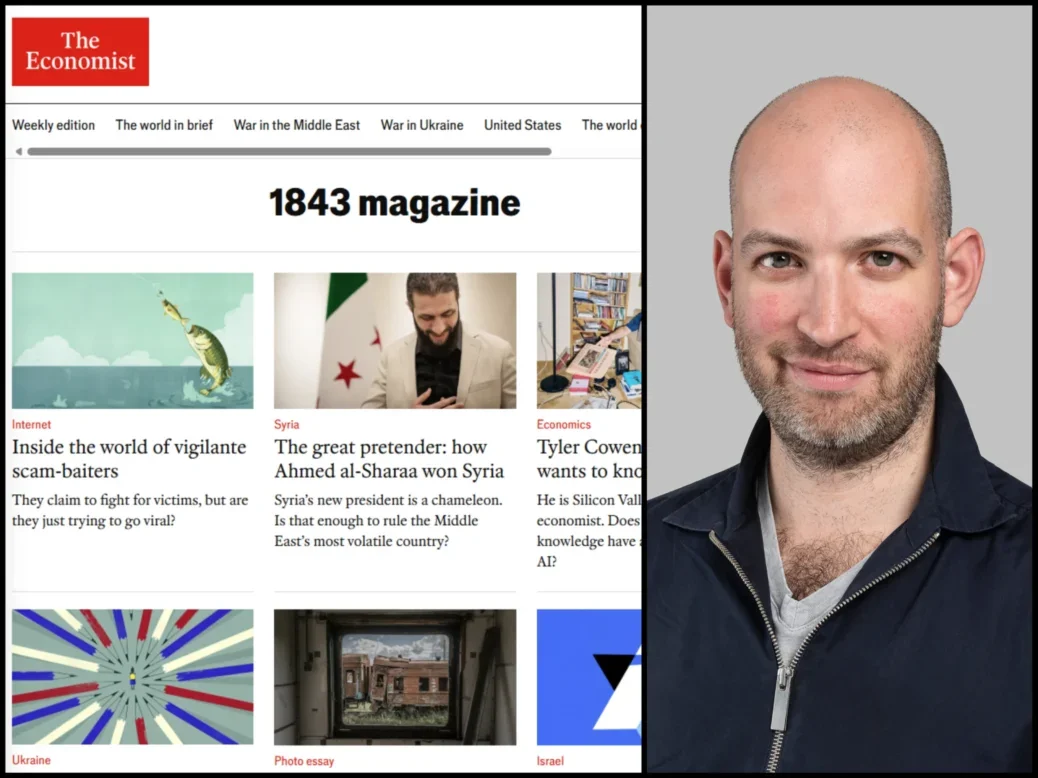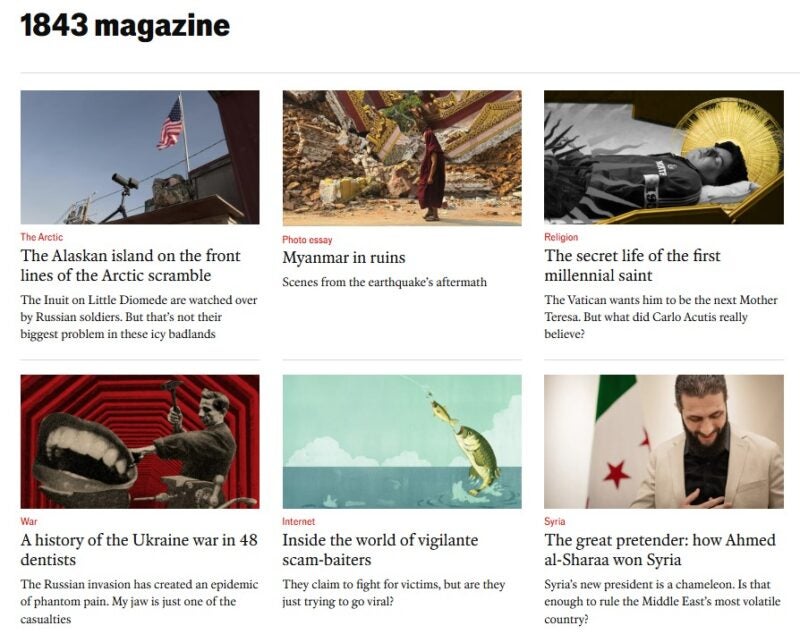
The Economist’s narrative journalism brand 1843 is gaining more recognition than ever despite its closure as a print magazine in 2020.
The 1843 magazine, named after the year The Economist was founded, was a bi-monthly print title dedicated to culture and ideas.
It ran from 2016 (after a rebrand from Intelligent Life) to August 2020 when it went digital-only, a decision already being considered but brought forward due to the Covid-19 pandemic.
1843 continues to run as a section on The Economist’s website and app and has become “increasingly integrated” within the parent brand.
Editor of 1843 Jonathan Beckman explained that The Economist does daily and weekly analysis of current topics while 1843 “tells the stories about what goes on in the world” in the form of what the website describes as “compelling long reads”.
While both cover similar subject matter, including politics, business, technology, war, migration and climate, they therefore do so in a different way.
The value of 1843 to The Economist is in adding to its all-round offering for subscribers, Beckman said. The Economist Group reported 1.187 million total subscribers as of 30 September last year and it is putting focus on “subscription growth and digital innovation”. It has some 783,420 digital subscribers, according to Press Gazette’s latest ranking of paywalled publishers.
Beckman said this means the 1843 team are “not under pressure to do stuff that brings in enormous volumes of traffic, but under pressure to do stuff that’s really good”.
The 1843 pieces tend to have “longer shelf lives because they’re not simply responding to the news”, he added.
They are often promoted over the weekend “because that’s when we think people have the time to read these long pieces that they can really immerse themselves in”.
About ten people work on 1843 including four editors, a US-based staff writer, a photo director and an art director. Otherwise a combination of Economist staffers and freelances contribute.
In recent years, 1843 narrative journalism has increasingly been receiving awards recognition.
Journalists working for 1843 won two British Journalism Awards in December: Thomas Dworzak in the Photojournalism category for his work documenting the plight of ethnic Armenians displaced by the Azerbaijani military offensive in September 2023, and Amanda Chicago Lewis in Technology Journalism for her piece about a ransomware negotiator. The Economist’s political editor Duncan Robinson also won the Comment Journalism award.
Four other 1843 writers and photographers were on the shortlist, including in the Features, Foreign Affairs and Sports categories.
The brand also boasted two winners in 2023: Christopher Occhicone in Photojournalism for his work in Ukraine and Sophie Pinkham in Travel Journalism for her investigation into migrants in the forest on the Belarusian-Polish border. Two others were shortlisted in the same categories.
Other awards for 1843 in 2024 included Wendell Steavenson winning the Orwell Prize for Journalism for reporting from Ukraine and Israel, and two prizes at the Foreign Press Association Media Awards.
Beckman told Press Gazette: “That’s our mandate, really: to do stuff that will win prizes.”
He said winning awards is “to the greater glory of The Economist: it gets the publication noticed, and gets it noticed for other things that people might not necessarily be aware that we do. It shows that we do a lot of investigations and other things that there’s not necessarily huge amounts of time to do on the paper. So we are able to complement The Economist journalists and journalism in various ways.”
Noting the multiple photojournalism award wins, Beckman said that at 1843 “we take photography very seriously” and often publish as many as 15 pictures in a piece.
“We want to keep up the quality of the photography from when we were a print publication so we devote resources to getting serious sets of photographs to illustrate our pieces… we think they tell a story as much as the words.”
The aim at 1843 is to publish one really good long piece a week. Beckman said this puts a premium on their output “firstly being really, really good, and secondly, original and we’re not just doing the same features that other people are doing”.
Beckman added: “We put a lot of time particularly into pieces. It’s very rare that a feature takes less than three months, let’s say, from conception to publication. Often it will take four or five. Sometimes it takes a year, sometimes it takes more…
“They’re very intensively edited. Like everything at The Economist we go through rounds and rounds and rounds of editing.”

Beckman also said 1843 and The Economist have a “very wide interest in stories from across the world” which provides an opportunity because “most publications, both here and in America – and I think we see the big magazines in America as people we want to emulate and rival – are quite insular in their outlook”.
He cited as an example a piece from February about a doomsday cult trying to take over Fiji.
“I think that’s a very ‘us’ story. But I think there’s lots of these stories there that I think lots of publications have a limited interest in.”
Beckman feels that there are not many publications doing this type of long-form journalism in the UK, citing The Guardian’s Long Reads and FT Weekend as two of the most significant.
“I wouldn’t say exactly it’s thriving,” he said. “I’m not sure it’s thriving in America either, or certainly not quite what it used to be in its heyday.
[Read more: Why is UK journalism short on long reads?]
“There are fewer and fewer outlets that do this kind of journalism, but it’s a very resource-intensive kind of journalism and in order to do it properly, you’ve not only got to pay people sufficient money to spend the time that they need to get these pieces in a really good situation, you also need to send them to places and allow them time there to report.”
For example, he cited a story last year about Ecuador becoming a narco-state for which the journalist was supported to be in the country with a fixer for two weeks.
“I think there’s fewer outlets that have those resources, or are able to, willing to put the money into them, and I’m very lucky that I work at The Economist – we value this journalism and value people going to places to find out what’s going on,” Beckman said.
The Economist and 1843 are increasingly working more closely and producing pieces in conjunction with each other. Beckman cited a piece this month by The Economist’s Middle East correspondent Nicolas Pelham about Syria’s new president, which sat alongside other journalism on the same topic across the magazine.
Beckman added: “We’re lucky that we work with a really super team of editors who, I think, are pound for pound probably the best in the world at what they do, and the stories are good because we spend a lot of time working on them.
“And I think that’s one of the reasons that our journalism wins award recognition, because we’re able to spend [time] – a story’s not coming in, and we’re having to knock it about a bit and turn it out through the door later on in the week.”
Email pged@pressgazette.co.uk to point out mistakes, provide story tips or send in a letter for publication on our "Letters Page" blog
